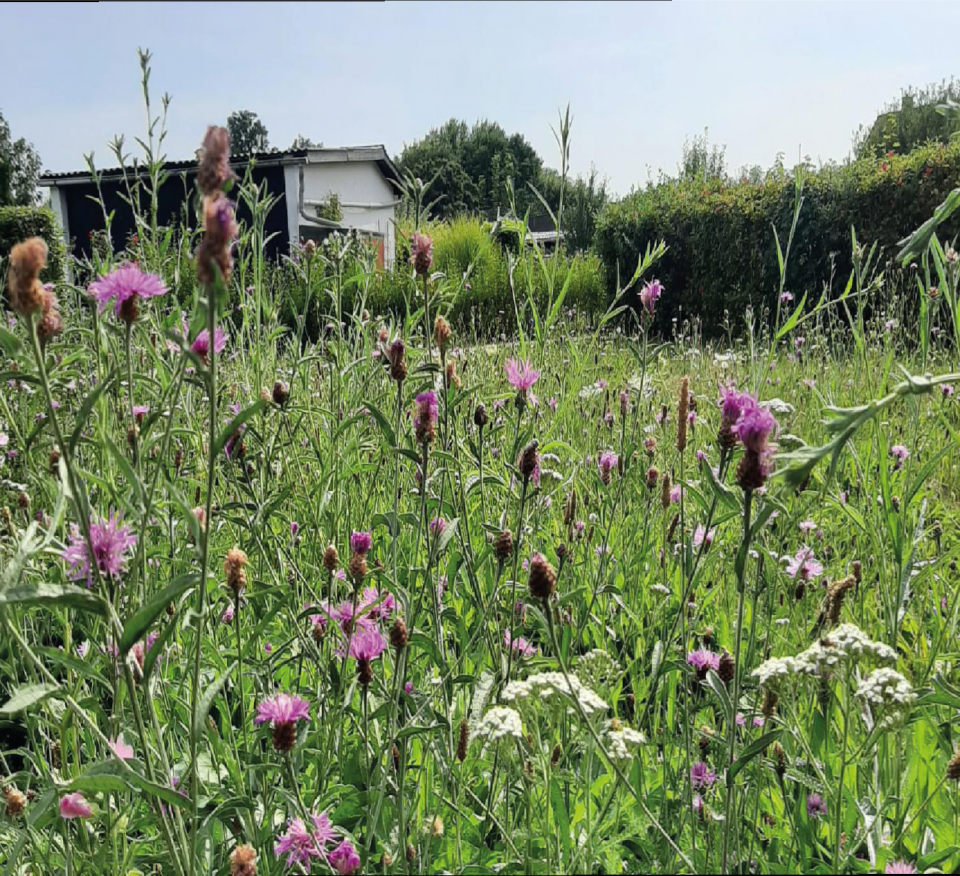
Huckarde is an old working-class district with large post-industrial areas. Gustav-Heinemann-Park is centrally located in Dortmund´s district of Huckarde and owned by the City of Dortmund.
In the western part a brick manufacture was operating between 1900 and 1925. Until the end of the 1960´s, all buildings were deconstructed, and the park area was partly filled with material from the brick manufacture and mine dump. The park was designed and realized in the 1980´s. Today, the park has vast extensively maintained grass areas as well as a large, old tree population. At three sides housing areas are next to the park. To the North a comprehensive school is bordering.
The necessity to re-establish flowering meadows and natural living spaces in urban areas to recreate habitats especially for pollinating insects has become increasingly important. Flower meadows have been implemented on several locations in the Living Lab and other city districts.
Location of Dortmund flower meadows (smaller projects not included):
Gustav-Heinemann-Park, Huckarder Straße, Grafen Grundschule, Allotment garden area Glückauf Hansa,
Naturfelder Dortmund e.V. was founded in order to convert urban spaces into pollinator friendly habitats. The structure of the association allows long-term existence beyond proGIreg. Main goals of the NbS implementations include:
- Activating interested citizens from the Huckarde and Deusen district for pollinating insects and biodiversity topics
- Sowing flower meadows or planting insect friendly plants that increase biodiversity on public or private land in cooperation with owners
- Participating in events to inform about pollinator friendly measures
- Supporting citizens or groups: implementation of pollinator friendly areas on their land
- Offering workshops in schools: e.g. sowing flower meadows, building insect houses
- Supporting projects of the municipal Department of Green Spaces: e.g. proposing usable areas for sowing or helping to irrigate newly seeded areas
- Involving a wide range of citizens, including vulnerable groups in co-design and implementation actions such as children in the seeding activities.
Planning and preparatory activities
(administrative and technical procedures)
Finding sites for the seeding activities proved timeconsuming due to several reasons:
- Housing companies were contacted in vain.
- Site visits on the former landfill Deusenberg revealed that the selected 1 ha area already benefitted from high ecological value.
- Contact to the Department of Green Spaces, City of Dortmund led to a cooperation for seeding on intensely cared for green areas in public parks (e.g. allotment area “Glückauf Hansa”, Gustav-Heinemann-Park).
In 2019, the Department of Green Spaces started a Dortmund-wide initiative “Stadtgrün naturnah” (“green city spaces close to nature”) for creating biodiversity habitats mainly in public parks. This cooperation created a win-win-situation, enabling the conversion of Huckarde areas earlier than planned. Grass and flower seeds typical for the Dortmund region have been selected in cooperation. The Department of Green Spaces orderd seeds twice, being refinanced by SWUAS.
SWUAS and Die Urbanisten established an NGO to identify new seeding areas for this NbS. The association Naturfelder Issum served as prototype.
Co-design and engagement activities
ProGIreg project partner aquponik manufaktur GmbH had founded an association called Naturfelder e.V. that converts plots into flower meadows in Issum, Germany. This concept has been adapted for the Dortmund Living Lab in collaboration with the Urbanisten and SWUAS in autumn 2020. Members of the association include activists and agriculture, permaculture and nature conservation experts.
The first co-design meetings took place online during Covid-19 lockdowns. Experts of pollinator diversity and general biodiversity from NABU and the City of Dortmund participated. This cooperation identified suitable spaces for conversion in public areas and selected regionally produced seeds most beneficial to increase pollinator biodiversity.
Therefore, contact with participants took place online but limited the target group, excluding potential participants who were less proficient with digital technologies, e.g. retirees who are nature-oriented, interested in ‘hands on’ nature projects and have time.
- Building trust during online sessions with the participating groups in comparison to physical meetings is more difficult.
- Lengthy approval processes to gain tax privilege “for the common good” due to missing information of the paperwork
- Lacking this special status, opening a bank account was not possible, therefore no new members could be attracted. This issue was finally solved after the association was legally registered in August 2022.
Naturfelder Dortmund has carried out soil preparation, seeding and irrigation at 10
sites in Dortmund. The first site was seeded in cooperation with the regional association EGLV (Emschergenossenschaft und Lippeverband) in spring 2021, even before the association was founded.
Success factors for social innovation (trust and liability) is a social contract between the different stakeholders by establishing the bottom-up citizen-led association Naturfelder e.V. The group advocate biodiversity and engage citizens in activities achieving:
- Citizen empowerment and promotion of public ownership of the NbS.
- Risk taking in social innovation,
- Being experimental and open for success but also for failure in the first attempts and developing the know-how for new implementations
The benefits for living beings in the Huckarde are multiple: environmentally, socially and indirectly contributing to public health through joint outdoor activities.
Apart from fostering biodiversity for pollinating insects and contributing to tighter habitat networks, the implemented flower meadows are aesthecially attractive, upgrading derelict or underused existing green spaces. It also serves as a good example of social innovation where citizens are empowered to take responsibilty for engaging actively in urban regeneration and transformation of their living environment.
- Restoring ecosystems and their functions
- Increase Biodiversity
- Increased cultural richness and biodiversity
- Enhancing sustainable urbanisation
- Changing image of the urban environment
- Increase accessibility to green open spaces
- Increase amount of green open spaces for residents
- Increase social interaction
- Provision of health benefits
- Social inclusion
- Social learning about location & importance of NBS
EU Horizon 2020 project:
Total implementation budget: 2,000 €
proGIreg funding: 2,000 € (SWUAS)
- Biodiversity
HansaGrün
e-mail: dortmund@naturfelder.de
websites: dortmund.de
hansagruen.de
naturfelder.de
proGIreg:
website: www.progireg.eu
